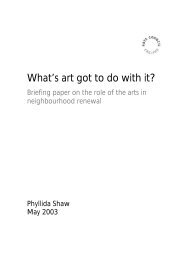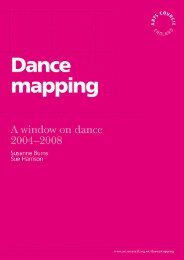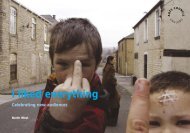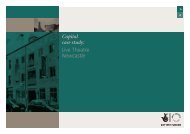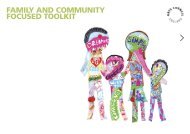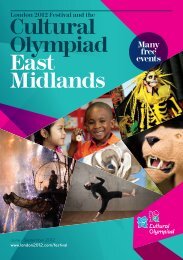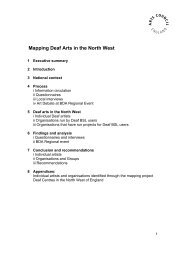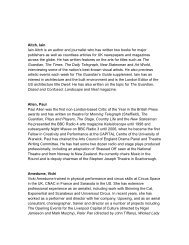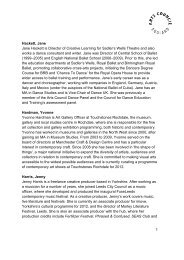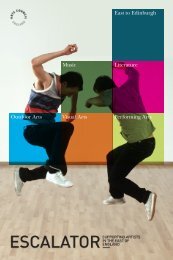Arts Council live chat with Alan Davey, Chief ... - Arts Council England
Arts Council live chat with Alan Davey, Chief ... - Arts Council England
Arts Council live chat with Alan Davey, Chief ... - Arts Council England
You also want an ePaper? Increase the reach of your titles
YUMPU automatically turns print PDFs into web optimized ePapers that Google loves.
<strong>Arts</strong> <strong>Council</strong> <strong>live</strong> <strong>chat</strong> <strong>with</strong> <strong>Alan</strong> <strong>Davey</strong>,<br />
<strong>Chief</strong> Executive<br />
This is an unedited transcript of the <strong>Arts</strong> <strong>Council</strong> <strong>live</strong> <strong>chat</strong> conversation on<br />
Wednesday 25 July 2012.<br />
ACE Moderator: Hello everyone, <strong>Alan</strong> <strong>Davey</strong> will be joining us at 12pm today but<br />
you can post your questions in advance for consideration between now and then.<br />
ACE Moderator: If you're having any problems <strong>with</strong> the <strong>chat</strong>room in you can email<br />
our support at <strong>live</strong><strong>chat</strong>help@cogapp.com<br />
<strong>Alan</strong> <strong>Davey</strong> joined the room<br />
ACE Moderator: Hello everyone, thanks for joining our <strong>live</strong> <strong>chat</strong> <strong>with</strong> <strong>Alan</strong> <strong>Davey</strong>,<br />
we’re about to get started. We hope to get through as many of your questions as<br />
possible in the next hour, but if we don’t get to yours there will be other<br />
opportunities to <strong>chat</strong> to <strong>Alan</strong> - please check http://bit.ly/ACE<strong>chat</strong> for forthcoming<br />
dates. We will make a transcript of this <strong>chat</strong> available online at http://bit.ly/ACE<strong>chat</strong><br />
when it is finished.<br />
<strong>Alan</strong> <strong>Davey</strong>: Hello everyone, <strong>Alan</strong> here. Welcome to our second <strong>live</strong> web <strong>chat</strong>.<br />
This is a great opportunity for the <strong>Arts</strong> <strong>Council</strong> to speak directly to audiences,<br />
artists and the general public about what we do and how we spend your money.<br />
I'm sitting in a very hot office, but it's great that we've got sunshine at last. Ask<br />
away!<br />
ACE Moderator: QUESTION FROM Jessica Pitt via Facebook:<br />
I love the strapline on this page; "working to get great art to everyone..." and<br />
believe that the <strong>Arts</strong> <strong>Council</strong> truly endeavours to achieve this outcome. There is<br />
barely any mention of the role of music in the <strong>live</strong>s of our youngest children in the<br />
Henley Review. Research suggests that this is the MOST formative period of<br />
human life where all the connections are being made for future learning and
emotional wellbeing. There is a patchwork of provision of early education and care<br />
and no simple way to join up music practice that takes place in Children's Centres,<br />
nurseries, day-care and school foundation classes. Many music practitioners are<br />
freelance in this field - do you see planning and including music in early childhood<br />
as part the Music Hubs' main service de<strong>live</strong>ry or an additional extra? Please could<br />
you give the arts council view as the commissioner of Music Hubs in considering<br />
the provision of music to children under 5? Thank you.(I am a doctoral researcher<br />
in Applied Music Research Centre: University of Roehampton and have over 20<br />
years experience as a music specialist in early childhood)<br />
<strong>Alan</strong> <strong>Davey</strong>: To Jessica Pitt:<br />
The <strong>Arts</strong> <strong>Council</strong>’s goal is for all children and young people to have the opportunity<br />
to experience the richness of the arts, and this includes the under 5s. Some of the<br />
organisations we fund as part of the National portfolio specialise in early years<br />
provision, as do the Youth Music grants. We’ll also explore the possibility of the<br />
<strong>Arts</strong> Award (which is developed and managed in partnership <strong>with</strong> Trinity College<br />
London) extending to the under 5sEarly years and foundation stage provision<br />
could well be something that a music education hub would want to undertake, but<br />
it is not one of the core or extension roles, so the funding from the Department for<br />
Education couldn’t be used but other sources of funding available for this kind of<br />
work, such as local authority funding, or project-based Lottery funding via Youth<br />
Music.<br />
#lostarts: Hi, & thanks for giving us the opportunity to ask questions. We have 2<br />
questions. What do you think about austerity, specifically the arts cuts' broader &<br />
long-term impacts? On both the sector and on local communities who enjoy, use<br />
and learn from them. Secondly, we don't blame you or managers- but we do blame<br />
Government. Do you, and do you think ACE as an arms-length body has a<br />
<strong>Alan</strong> <strong>Davey</strong>: To lostarts:<br />
In public spending terms, the arts cost very little but they offer untold wealth to<br />
people, communities and this country. I will always argue that candle end savings<br />
on arts and culture are a real false economy. Any society that doesn't value the<br />
arts is a very small-minded one. You ask me about blame: blame is an emotion<br />
that eats at the soul and, actually, we need to get on and make the case for the<br />
arts and protect what we really value. And that's our main focus at the <strong>Arts</strong> <strong>Council</strong><br />
at the moment.
ACE Moderator: QUESTION FROM Susan Forsyth via Facebook:<br />
Can you comment on the spread of the Artists International Award? 50% of the<br />
projects are in Europe. Though I am pleased for the individual artists, almost 20%<br />
of the funded projects are in Germany (5) more that the whole of Asia (4), North<br />
America(4), Africa (2) or South America (0.5). There are many existing<br />
opportunities for artists to work in Europe, indeed low cost flights & EU law makes<br />
it much easier. I feel that the global reach and pre-existing opportunities should be<br />
taken into account in the next tranche of British <strong>Council</strong>/ACE money.<br />
<strong>Alan</strong> <strong>Davey</strong>: To Susan Forsyth:<br />
As you can imagine this was a really popular fund. We received almost 300<br />
applications which meant that competition was really high and there were a lot of<br />
great projects proposed for all over the world. We tried to be as fair as possible to<br />
all applicants so there was no weighting for art form or geographical location,<br />
successful applicants were chosen on the strength of their application. Of the 25<br />
successful applicants, 14 are travelling beyond Europe to places like Egypt,<br />
Indonesia, Sri Lanka and the USA. That’s over half of the applicants so I do<br />
believe that there has been a good spread. But I would also say that Europe does<br />
matter and I do get concerned that there isn't enough contact between artists in<br />
this country and some of the things going on in Europe. We mustn't ignore our<br />
nearest neighbours. I've just come back from the Avignon Festival and am full of<br />
thoughts about how we can learn from some of the artistic developments in<br />
Europe as well as the rest of the world.<br />
ACE Moderator: QUESTION FROM @oohmince Via Twitter:<br />
How do you plan to sustain the momentum of the Cultural Olympiad given<br />
anticipated further cuts in arts funding?<br />
<strong>Alan</strong> <strong>Davey</strong>: To oohmince:<br />
The Cultural Olympiad has been and continues to be a great showcase for what<br />
arts and culture in this country is and can do. It's been positively Olympic in its<br />
aspiration and achievements and we now have to say to those in charge of the<br />
purse strings that this has shown a level of achievement that we have to maintain.<br />
I believe having any loss of momentum after this year is unthinkable.
ACE Moderator: QUESTION FROM Gary Green via email:<br />
How do ACE aim to ensure that the non-arts aspects of libraries is developed as<br />
much as the cultural and arts aspects? Areas such as (but not only) support for<br />
education & literacy, community & social aspects are as important as the cultural<br />
and arts focus of libraries. Will the ACE charter and mission statement be<br />
amended to reflect your new responsibilities that go beyond the arts, as indicated<br />
above?<br />
<strong>Alan</strong> <strong>Davey</strong>: To Gary Green:<br />
We are already working hard to ensure that we join up arts and cultural activity<br />
<strong>with</strong> the wider libraries agenda, mainly through the Libraries development initiative<br />
announced in January. Areas such as education and literacy will be targeted<br />
through projects like the one led by the London Borough of Richmond, which tests<br />
the de<strong>live</strong>ry of adult learning in libraries. The Books on Prescription project will<br />
also help libraries address health and social care issues by prescribing books from<br />
a list of high quality self-help manuals for people suffering from common mental<br />
health problems. It is also worth noting that most of the artistic activities going on<br />
<strong>with</strong>in libraries will be used to support education and literacy, and will involve local<br />
communities. In answer to your second question, our mission statement has<br />
already changed to reflect our wider cultural remit and is very much embedded in<br />
our decision-making framework Culture, knowledge and understanding. Our<br />
charter has also been updated.<br />
ACE Moderator: QUESTION FROM Oj Lg via Facebook:<br />
Why do about 5-7 organisations in the Professional Theatre Companies (like the<br />
RSC, National Theatre etc) in the UK receive millions of pounds and other smaller<br />
theatre companies receive little or no funding as part of the National Portfolio<br />
Status 2012-15?Wouldn't it be better to have more Theatre Companies benefit<br />
from the <strong>Arts</strong> <strong>Council</strong> than less and bigger theatre companies receiving more<br />
money - its seems like a Robin Hood strategy to me?<br />
<strong>Alan</strong> <strong>Davey</strong>: To Oj Lg:<br />
There are actually 179 Theatre organisations of all shapes and sizes in our<br />
National Portfolio – including building based theatres, production companies and<br />
touring. But NPO status doesn’t suit everyone because it carries responsibilities<br />
that some prefer not to shoulder. Many are better off <strong>with</strong> Grants for the arts, which<br />
funded 531 theatre applications last year. The big theatre companies in our<br />
National Portfolio commit to much more than producing great art. They are
expected to make a significant contribution to the <strong>Arts</strong> <strong>Council</strong>’s goals for the arts –<br />
working <strong>with</strong> other theatre companies across the country, expanding and<br />
diversifying audiences, education programmes and the like. The bigger the grant,<br />
the greater the responsibility. What matters is that a wide variety of artists get to<br />
make work that touches and reaches audiences across the country. We need to<br />
make sure there is a balance of big and small organisations working as a healthy<br />
ecology, and that those organisations that we do fund we fund to the right level<br />
and do not spread the money too thinly.<br />
ACE Moderator: QUESTION FROM @mand62 Via: Twitter<br />
How do you expect your staffing changes to affect organisations that you fund?<br />
<strong>Alan</strong> <strong>Davey</strong>: To mand62:<br />
We're doing our best to keep our service to arts organisations and to artists as<br />
good as it can be. We’ll continue to have relationship managers on the ground<br />
dealing <strong>with</strong> arts organisations and artists face to face. You'll appreciate that <strong>with</strong><br />
150 less staff this is a pretty difficult thing to achieve, so we're streamlining our<br />
processes, reorganising ourselves in an even leaner way to offer the best possible<br />
service. You can't make savings of that magnitude <strong>with</strong>out it inevitable affecting<br />
the amount we can do - but I'm optimistic that in our new incarnation we'll be<br />
effective in how we serve the interests of arts and culture - and that's my bottom<br />
line.<br />
TheatreShy: Is the <strong>Arts</strong> <strong>Council</strong> too concerned <strong>with</strong> large organisations and vanity<br />
projects rather than the arts ecology as a whole?<br />
<strong>Alan</strong> <strong>Davey</strong>: To Theatreshy:<br />
Not at all! The whole basis behind the last NPO funding review was to make sure<br />
we had a balanced ecology <strong>with</strong> large flagship organisations in a healthy state and<br />
a whole variety of smaller organisations funded to a level that will allow them to do<br />
their jobs well. In every art form we have to look at that whole ecology and our<br />
concern for smaller organisations is evidenced in our Grants for the arts<br />
programme, where we said NPOs could not apply, thereby making sure that we<br />
were letting into our funding system organisations from all parts of the arts<br />
ecology. And I want us to continue this going forwards. By the way - I'm not<br />
conscious of the <strong>Arts</strong> <strong>Council</strong> undertaking any vanity projects; we're just interested<br />
in great art being seen by as many people as possible.
Silent Pete:<br />
What experience does the arts council have to oversee museums and libraries?<br />
<strong>Alan</strong> <strong>Davey</strong>: To Silent Pete:<br />
We've taken on a significant number of former MLA staff and recruited new people<br />
<strong>with</strong> the right knowledge to enable us to look after these new sectors. We’ve<br />
sought to engage both sectors in a constructive way and have listened very hard<br />
to their concerns and needs. We’re getting good feedback from the sectors about<br />
the way we've done this and so I think you cannot say we lack the right expertise.<br />
ACE Moderator: QUESTION FROM Annie Yactor via Facebook:<br />
Mr <strong>Davey</strong>, Why does ACE give £60k-£90k grants to theatre companies like<br />
Youmebumbumtrain who use it pay the Artistic Directors and 20 crew but fail to<br />
pay actors? Why should other grant recipients who pay ALL staff have to unfairly<br />
compete <strong>with</strong> companies that fail to pay actors? Why do you think their business<br />
model is a good and sustainable model for the industry?<br />
<strong>Alan</strong> <strong>Davey</strong>: To Annie Yactor:<br />
Of course the <strong>Arts</strong> <strong>Council</strong> encourages all applicants for funding to employ best<br />
practice in regards to both paid positions and volunteering opportunities. We aren't<br />
funding the current performances of Youmebumbumtrain, but we did fund them<br />
previously via Grants for the arts. In their applications, they were clear that<br />
participants took part voluntarily and were entirely free to take part at their own<br />
discretion. The budget set out in their application showed that everyone who was<br />
to be contracted in a professional role on the production was paid in line <strong>with</strong><br />
industry standards.<br />
ACE Moderator: QUESTION From Catalyst via <strong>chat</strong>room:<br />
Is it realistic to expect very significant increases in income from private donors and<br />
commercial organisations in the current climate, and certainly <strong>with</strong>out significant<br />
tax breaks and a long-term strategic approach to changing the UK philanthropic<br />
culture? Is the Catalyst fund in danger of simply providing many additional<br />
fundraisers to approach a pot of donors that isn't going to grow that much?<br />
Particularly how do smaller companies compete?
<strong>Alan</strong> <strong>Davey</strong>: To Catalyst:<br />
This is about helping organisations to become more resilient for the future. In my<br />
report on endowments I was very clear that philanthropic and commercial<br />
sponsorship is not a short-term fix and is only one part of the funding mix that has<br />
to remain publicly funded at its heart. Donors want to fund success; they want to<br />
fund something extra - and I want to help organisations get better at convincing<br />
those <strong>with</strong> money to give that culture is a good cause worth giving to. Changing<br />
the philanthropic culture in this country will take 20 years. Catalyst is one response<br />
to help organisations meet that challenge but it's not an instant answer and, I have<br />
to emphasise again, does not and should not replace core public funding. That is<br />
the bedrock of the mixed economy of the arts in this country and we should never<br />
forget that.<br />
Curious Minds:<br />
Hi <strong>Alan</strong>, looking at all things future positive what is the dream situation for arts and<br />
culture and children and young people in three years’ time and what is the<br />
probable situation in three years’ time? Also what or who inspired you when you<br />
were young?<br />
<strong>Alan</strong> <strong>Davey</strong>: To Curious Minds:<br />
My dream is for young people to be able to discover art and culture and, if they<br />
have a talent, to be able to take that as far as it can go - no matter what their<br />
background. With schemes like <strong>Arts</strong>mark, <strong>Arts</strong> Award, Music Hubs, our funding of<br />
Bridge organisations and working <strong>with</strong> other funders in response to the Henley<br />
Review, we're putting in place some essential building blocks for this to develop.<br />
But we have a lot to do and we also need to look at the position of Humanities in<br />
higher education and people's ability to get the training they need and, indeed their<br />
first jobs and ability to make a living from their talent. In the autumn we'll be<br />
announcing a scheme for paid internships in the arts but you are right to suggest<br />
that we will not have done everything we want to in three years' time. WE have to<br />
keep working at it. As for what inspired me when I was young, it was, frankly, a<br />
teacher - who showed me that the arts WERE for someone like me, living on a<br />
council estate, and that I could go on to university and end up where I am now.<br />
TheatreShy: How do you ensure that your staff are appropriately qualified and<br />
trained? You are in the position of expert and critical friend - yet surely those most
qualified are working artists and working <strong>with</strong>in organisations - those making art,<br />
rather than civil servants administering funds?<br />
<strong>Alan</strong> <strong>Davey</strong>: To Theatreshy:<br />
You seem to be suggesting that everyone who works in the <strong>Arts</strong> <strong>Council</strong> is a<br />
boring bureaucrat. Actually, many people who work here are practicing artists and<br />
they have a great deal of knowledge about their art forms which is of course very<br />
important. But we need a range of skills in the <strong>Arts</strong> <strong>Council</strong> - to make sure that<br />
money gets to where it needs to go, and that we properly account for it to<br />
parliament. And incidentally, civil servants can be passionate and knowledgeable<br />
about the arts, too. There are a large number of these at the DCMS and it's<br />
important that they're there.<br />
ACE Moderator: QUESTION FROM Sally Sheinman, Chair of AIR, via Twitter<br />
@AIR_artists:<br />
Do you have a plan to increase the number of visual artists on decision making<br />
panels?<br />
<strong>Alan</strong> <strong>Davey</strong>: To Sally Sheinman:<br />
I absolutely believe that artists from all art forms have valuable ideas and opinions<br />
to contribute – in addition to those they express through their work. That’s why we<br />
do involve them in our decisions – through consultation on many of our developing<br />
policies and funding programmes, through the artistic assessment and peer review<br />
systems they helped to develop, and via the artistic expertise of our regional and<br />
national <strong>Council</strong> members. It’s also why the theme of our annual State of the <strong>Arts</strong><br />
conference this year was ‘Artists Changing the World’. And of course we’re always<br />
looking at ways to improve which, in the context of having to make 50%<br />
administrative savings next year, we’re currently considering our future<br />
governance arrangements – which will give us the chance to think again about the<br />
advisory role of artists <strong>with</strong>in that.<br />
Mac: Hello <strong>Alan</strong>, Thank you for answering questions today. Has a review or<br />
evaluation of the application phase of Creative People and Places Fund? It would<br />
be interesting to know how much time and other costs hard-pressed individuals<br />
and organisations incurred - especially those who were unsuccessful. It would<br />
appear to yet again dominated by the usual suspects - local authorities,<br />
established bigger arts/cultural organisations, however even that is difficult to<br />
determine as there is no published information about the consortia, bid content or
who was successful or not. So much for transparency! In my experience it proved<br />
an incredibly time consuming, wasteful and counter-productive experience<br />
especially for those 'new and diverse' partner organizations we encouraged to get<br />
involved… sadly most of them will not get involved again in a hurry. Sorry to moan,<br />
but this looked like a 'new dawn'... Best wishes Mac<br />
<strong>Alan</strong> <strong>Davey</strong>: To Mac:<br />
Thanks for joining in. Creative People and Places is a brand new fund which is<br />
absolutely about involving grass roots organisations and communities in decisions<br />
about what sort of art they want to see and get involved in. We’ll be making the<br />
announcement about the first round of successful applicants very soon and I think<br />
you'll see that they're not 'the usual suspects'. And before we launch round two we<br />
will be looking at the application process, guidance etc and making any<br />
adjustments we feel necessary, given the experience of round 1. As this is Lottery<br />
money we have to have some sort of application process but we're committed to<br />
learning from every process we run. As a rule we never talk about unsuccessful<br />
applicants to any of our programmes as this might affect their ability to secure<br />
funding elsewhere.<br />
nolarae:<br />
The Rumor Mill is pretty active at the moment, saying that the DCMS will be split<br />
up after the Olympics. What potential threats does this pose for <strong>Arts</strong> <strong>Council</strong> not<br />
having DCMS holding 'wolves', i.e. other Govt Depts taking funding away from the<br />
<strong>Arts</strong>?<br />
nolarae: Sorry should read 'holding back the wolves'<br />
<strong>Alan</strong> <strong>Davey</strong>: To nolarae:<br />
Well, I'm not sure that wolves get much from DCMS budgets - it being the smallest<br />
department in Whitehall by far. Whatever happens, they'd need to protect budgets<br />
for arts and museums and there would need to be a place in Whitehall to represent<br />
their interests. In the past this has been the Cabinet Office, the Education<br />
department or even the Treasury direct. Some other countries such as Australia<br />
put arts and culture as part of the Prime Minister's office, reflecting their<br />
importance. So if there is a proposal to abolish the DCMS there will need to be a<br />
convincing alternative so that the interests of arts and culture remain at the heart<br />
of government. And that is the case we - the sector and the <strong>Arts</strong> <strong>Council</strong> - have to<br />
argue as strongly as we can. It seems to me to be a false economy to abolish a<br />
body if you then have to reinvent it elsewhere.
<strong>Alan</strong> <strong>Davey</strong>: Thanks everyone for joining the <strong>chat</strong> today. Sorry I've not been able<br />
to answer every question - Liz is up again in a few weeks and I'll be here again in<br />
the autumn.<br />
ACE Moderator: Thanks everyone for taking part in today’s <strong>chat</strong>, if there wasn’t<br />
time to answer your question, there will be another opportunity to <strong>chat</strong> to <strong>Alan</strong><br />
<strong>Davey</strong> - to stay informed visit http://bit.ly/ACE<strong>chat</strong> or follow #ACE<strong>live</strong><strong>chat</strong> on<br />
Twitter.




![More than potato prints [PDF 451.9 KB] - Arts Council England](https://img.yumpu.com/19437752/1/190x135/more-than-potato-prints-pdf-4519-kb-arts-council-england.jpg?quality=85)
